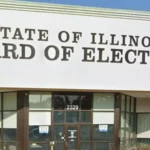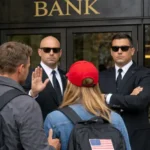
The National Education Association (NEA) is one of America’s most powerful public-sector unions. Their Washington, D.C., headquarters has at their disposal over 3 million members and an annual budget eclipsing $370,000,000.
The NEA is purportedly organized to improve the education available to American students by giving a voice to public educators. Unfortunately, as with many other teachers’ unions across the United States, this behemoth organization has wielded its enormous resources to advance a leftist political agenda.
Since the 1990s, Landmark Legal Foundation has been one of the most prominent opponents of the NEA’s agenda.
Our small cadre of lawyers, devoted to the principles of Originalism, has not shied away from confronting America’s largest teachers’ union. Over the course of several decades, Landmark has defeated the NEA in multiple state supreme courts; the Internal Revenue Service (IRS) complaint process; the Department of Labor regulatory process; and even the Supreme Court of the United States.
Today, other public sector unions appear to use some of the same illicit tactics once employed by the NEA. In light of these allegations, Landmark would like to revisit our record of challenging the teachers’ unions’ unscrupulous behavior.
We hope that these historical examples serve as a foreboding. The legal framework for nonprofit political activity has an expectation of transparency and integrity. And the Landmark Legal Foundation remains committed to ensuring that the left is not able to distort the marketplace of ideas by improper political spending.
The Battle for School Choice
Landmark first came to blows with the NEA during the earliest stages of America’s “school choice” movement.
In April 1990, the Wisconsin State Legislature passed the Milwaukee Parental Choice Program (MPCP), the nation’s first school voucher program. The MPCP allowed for talented, low-income, urban students to place into high-performing, non-religious private schools. For the families of students locked into Milwaukee’s failing public schools, this program provided a life-changing escape valve. For the NEA, however, the MPCP represented a threat to their monopoly over America’s children.
The NEA, alongside other groups, filed a lawsuit seeking to strike down the MPCP. Landmark, representing several low-income Milwaukee families as well as the legislation’s author, defended the MPCP all the way up to the Wisconsin State Supreme Court. After years of litigation, in March 1992, Landmark prevailed for its clients when the state’s highest court declared the program constitutional.
Nevertheless, the NEA persisted.
In 1995, the Wisconsin legislature expanded the MPCP to include vouchers for religious private schools. The NEA challenged this action, beginning years of litigation which sought to overturn the expanded school choice program. Landmark successfully argued these motions to a standstill, winning again with the Wisconsin Supreme Court. Ultimately, in 1998, the U.S. Supreme Court sided with Landmark in refusing to accept the NEA’s petition for appeal.
While the MPCP battles were among the most publicized, they were not Landmark’s only encounters with the NEA’s school choice litigators.
In 1995, the NEA sued a Pennsylvania school board for hiring a private management firm to run a hopelessly underperforming elementary school. The union also secured an injunction against the contract, leading certain board members to be held in contempt of court and even threatened with removal from their posts.
Landmark successfully challenged the NEA’s intimidation tactics, pushing for an appeal to the Pennsylvania Supreme Court. Once again, at a state’s highest court, Landmark defended the school board’s right to privatize failing schools. The Pennsylvania Supreme Court sided with Landmark and the Wilkinsburg School Board, striking down the NEA’s lawsuit and setting an important judicial precedent in defense of school choice.
Unreported Political Activity: The IRS Steps In
In light of these cases fought during the 1990s, Landmark became well acquainted with the NEA’s inner workings. In addition to their ruthless crusade against school choice initiatives, it became apparent that the NEA placed an obsessive focus on progressive political causes.
Indeed, to a large degree during the 1990s, NEA resources became important weapons in the Democrat’s national campaign arsenal.
Landmark concluded that the sources of the NEA’s enormous political power should be investigated. The results of this investigation were astounding.
There is nothing illegal about unions campaigning for political causes. A public-sector union’s political activities are protected under the free speech provisions of our Constitution. But when political speech is directed to the general public and financed with tax-exempt dollars, the Internal Revenue Code requires a union to report those expenditures as taxable income.
In June 2000, Landmark filed a historic complaint with the IRS requesting an audit of the NEA’s political expenditures. Three years in the making, this complaint was the product of extensive research into the NEA’s compliance with regulations governing the spending by tax-exempt organizations.
Tax-exempt organizations are required to segregate their political expenditures from the general treasury fund. Moreover, they are required to disclose these expenditures on their tax returns or “Form 990” reports. Even if the final political activity is conducted by a different, affiliated entity, the parent organization is required by law to report any general treasury expenditures used to support the affiliated group.
These regulations are imperative to the integrity of America’s political spending regime. They exist to ensure that political contributions do not escape taxation – lest American taxpayers be made to subsidize the activities of political groups.
In spite of these requirements, the NEA failed to disclose a single penny of political spending between 1994 and 2000 on its Form 990 tax returns.
Accordingly, the NEA avoided taxation on their myriad political activities. Their “UniServ” program, for example, dispersed thousands of NEA employees across the nation to operate as political organizers. According to the NEA’s “Strategic Plan and Budget,” given to Landmark by an NEA whistleblower, this UniServ program was budgeted for an eye-watering $150,135,000 between 1998-2000. Yet according to their IRS filings, there was not a single expenditure involved in these sorts of nationwide endeavors.
Before Landmark filed its complaint, the NEA reaped tremendous rewards for these tax-free political expenditures. During the 1996 Clinton-Gore campaign, the NEA was awarded a seat on a DNC steering committee. According to documents Landmark later obtained from the Federal Elections Commission (FEC), the NEA was even granted veto power over key planks in the Democrat policy platform.
Unfortunately for the progressive leadership at NEA HQ, the IRS refused to let the issue slide once Landmark brought its complaint to their attention.
During the 2000s, the NEA was subject to multiple audits. While the IRS is prohibited by law from disclosing the results of individual audits, the NEA was subject to whatever penalties deemed sufficient by the tax examiner, possibly including the payment of extensive fines and back taxes. In addition to these penalties, Landmark also recommended criminal investigations against the NEA officers responsible for the violation.
National Labor Reform
In addition to the IRS complaint, in 2002 Landmark filed an extensive complaint against the NEA to the U.S. Department of Labor. As it turned out, the NEA was not merely obfuscating its activities from the public or the tax man, but also from its own membership.
Under the Labor Management Disclosure and Reporting Act (LMDRA), unions are required to explain their political expenditures to their membership. During its research for the IRS complaint, however, Landmark discovered that the NEA had failed to disclose and adequately describe their political expenditures on their Form LM-2’s.
When Landmark raised this issue with the Department of Labor, the agency acknowledged that existing reporting rules were not extensive enough to have captured the NEA’s activity. In a letter responding to Landmark, the Department even acknowledged that they would revise the LM-2 Forms to ensure more accurate reporting from the unions, as well as enhance the budget for their auditing departments.
In resolving these issues with the LM-2 forms, Landmark set another important legal precedent that would hold the NEA and other unions accountable to both their membership and the taxpaying public.
Resolutions
In 2002, the U.S. House Committee on Education and the Workforce convened a hearing to investigate the NEA’s illicit political activities. Then Landmark President Mark Levin was invited to testify before Congress, alongside the NEA’s General Counsel Bob Chanin.
Mr. Levin’s testimony convinced the Chairman of that committee, Rep. Charlie Norwood (R-GA), to write a letter to the IRS requesting prompt action on Landmark’s request for an audit. As several audits ensued over the following years, Landmark again emerged as a clear winner from these Congressional disputes against the NEA.
A frustrated Bob Chanin later panned Landmark Legal Foundation by name in an address to the NEA National Convention, asking “Why are these… right-wing bastards picking on the NEA and its affiliates?”
As the IRS demonstrated through its multiple audits, it was most likely because these public-sector unions had been taking advantage of their membership and the American taxpayer to advance their political agendas.
An important outcome of Landmark’s efforts is that the NEA finally started disclosing political activity on their tax forms. Thanks to Landmark’s work, a firm message was sent to politically active unions across the nation: It is against the law for tax-exempt groups to not disclose their political expenditures. Because of this deterrent, greater transparency has been encouraged by all parties in our political process.
Landmark has been disappointed by the apparent failure of at least one other group to abide by these principles. The American Federation of Teachers (AFT) seems to have adopted many of the same techniques once used by the NEA to skirt taxes on their political activities.
In light of the NEA’s consequences for such practices, particularly when brought under the scrutiny of the Landmark Legal Foundation, the AFT should ensure that its tax practices are honestly complying with the appropriate federal statutes and regulations.
SUPPORT LANDMARK LEGAL FOUNDATION
We are truly facing existential threats to our individual rights and liberties, the Constitution, and our national character. If unchallenged, this assault on our very way of life will ruin our great nation. With your financial and moral support, Landmark is not going to let that happen without a fight. Will you join us?





